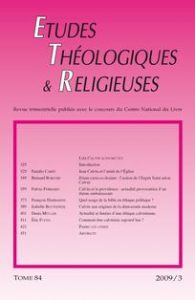Éric Fuchs propose de réfléchir à la vive tension qui travers l’œuvre de Calvin, entre fascination pour la grandeur du mystère insondable du dessein de Dieu et volonté sans défaillance d’organiser l’Église et la société en conformité avec la Loi de Dieu. Cette apparente incohérence n’est jamais résolue par Calvin. C’est ce qui donne à sa pensée sa force et son dynamisme. Être calviniste, c’est refuser une spiritualité qui n’aurait aucune retombée politique et sociale, et refuser un engagement politique que n’accompagnerait par l’humilité née de la conscience de notre fondamentale ignorance des fins ultimes de notre action..
In this paper Éric Fuchs reflects upon the deep tension between Calvin’s fascination for the greatness of the unfathomable mystery of God’s will on the one hand and his unrelenting wish to organise the Church and the society in agreement with God’s Law on the other hand. This tension is never resolved by Calvin, and this is what gives his thought such strength and dynamism. Being a Calvinist means refusing a spirituality which would have no political or social downfalls, as well as refusing a political involvement which would not be linked to humility born out of the conscience of our fundamental ignorance of the ultimate goals of our action.
p. 411-419
Auteur
FUCHS Eric
Éric FUCHS est pasteur, professeur honoraire d'éthique à la Faculté de théologie protestante de l’Université de Genève.
